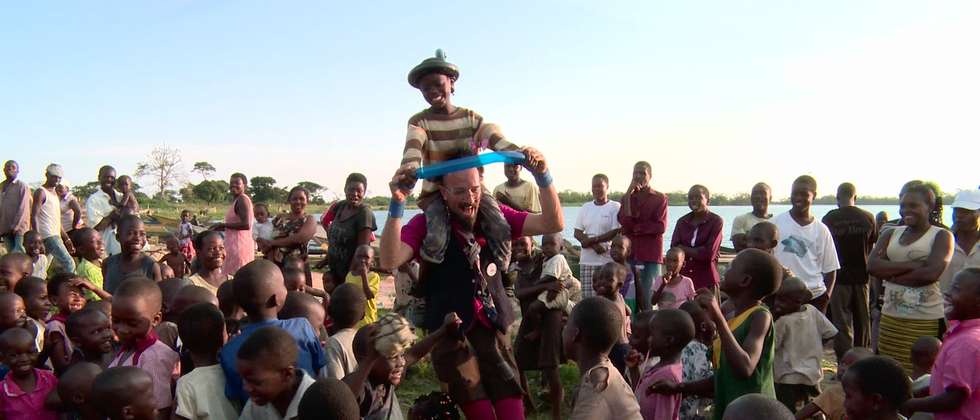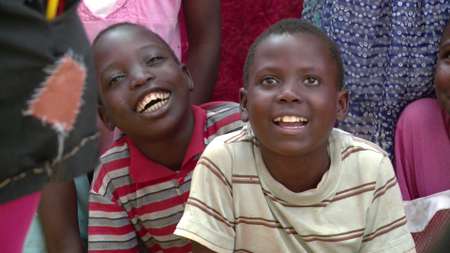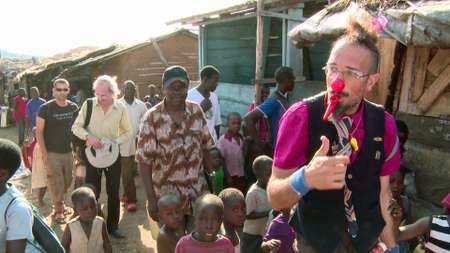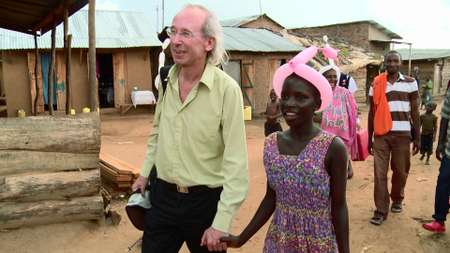AIDS patients are finally getting treated since The Art Joy Love organization sends Israeli volunteers to Africa
By Tami Harel
It takes a full day to get from Tel Aviv to the Island of Bussi in Uganda. The journey begins with a flight to Addis Ababa and continues with a long layover followed by a connecting flight to Entebbe. One crosses Lake Victoria by ferry and only after a long canoe cruise arrives to Bussi.

Uganda – Photo: i24news
Bussi Island in Uganda. One of the many islands scattered on Lake Victoria and one of the world’s main focal points of AIDS. About 16 percent of the island’s inhabitants are infected or sick with AIDS. One in three babies already carry HIV by the time they are born.
We came on this journey with Professor Dan Engelhard of the Hadassah Ein Kerem Medical Center in Jerusalem. Eight years ago, Engelhard founded the Art Joy Love organization that sends Israeli volunteers to Africa to help AIDS patients.
But Engelhard did not come here alone. Accompanying him is Tito, whom the children at the orphanage know well from previous visits. When Engelhard founded his organization, he understood that he had to take care of AIDS patients, and especially the children, not only with drugs, but also with joy and love. And this is what medical clowns and other volunteers who come to Africa every year are supposed to provide.

Uganda – Photo: i24news
Together with us, Dr Reut Harel and Dr Eitan Miran also arrived on Bussi. Reut and Eitan are a couple who recently finished medical school in Israel and decided to go to Uganda with their one and a half years old son.
One and a half years ago Professor Engelhard assisted in the foundation of the Bussi Medical Center, but insisted that it will be run by local doctors. Art Joy Love sent volunteer doctors, nurses, social workers, medical clowns and also young people who prefer to come here and volunteer over backpacking in the East.
Until the establishment of the medical center, residents of the nearby islands received no health services. When they were in need of treatment they were forced to travel to hospitals in Kampala or Entebbe, many hours away by car. In most cases they gave up on the trip and even on their lives.

Uganda – Photo: i24news
In the year and a half that the Medical Center has existed the percentage of AIDS cases went down from 18 percent to 16 percent — a great success by any measure.
In the Medical Center, we met Alineo, four years old and HIV-positive. His mother is sick with AIDS and unable to care for him and so his grandmother took him in and, despite his mother’s opposition, began to treat him with medication. In fact, she saved his life.
In the room next door is Sharon, 16-years old, who gave birth to a baby girl just days earlier. Just as she reached the Medical Center, she discovered she was HIV-positive. Professor Engelhard checks Sharon who suffers from a high fever and fears that she might develop a dangerous infection in the uterus. In the coming days blood tests will be performed on her baby to determine whether she contracted AIDS.
Before returning home, Engelhard and Tito have to take care of one of the most important tasks. They enter a boat and sail to Kachanga, an island opposite Bussi. Kachanga is considered to be the island with the most difficult living conditions, the highest percentage of AIDS and the highest number of abandoned children.

Uganda – Photo: i24news
The AIDS percentage in Kachanga is very high mainly due to a lack of awareness of the disease. The residents here do not know how to defend themselves against the disease, and when they are sick, they do not even know that it can be treated. This is exactly what the Israelis are trying to change.
Professor Engelhard briefs Drake Kanebo, director of the orphanage, on the essential points and then, using an old megaphone, Kanebo calls for the locals to come and get tested. He appeals especially to pregnant women and tells them that if they want to give birth to healthy babies, they need to come to Bussi, get tested, and if they are positive — start medical treatment.
This is the first time that the residents of this island realize that AIDS is not a force majeure – that this is a disease that has a treatment, and that this treatment can prolong their lives.
Six days pass and us and the Israeli team leave Bussi. Soon we will get back to civilization: The world with electricity, cell phones and running water.
It is sad to leave behind the hundreds of smiling orphans that we took into our hearts and the patients in the medical center.
“Yes, it’s a small organization,” Professor Dan Engelhard tells us, “but a drop and another drop and another one and at the end will be change.” Hopefully.
Tami Harel is the director of the film “Larutz” and head of television magazines at i24news.
View original i24news publication at: http://www.i24news.tv/en/news/international/africa/140526-israeli-hope-in-uganda






 Israeli New Shekel Exchange Rate
Israeli New Shekel Exchange Rate